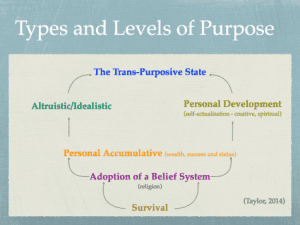By Steve Taylor Ph.D
Guest Writer for Wake Up World
Transpersonal Purpose: When we no longer have a purpose but become a purpose.
To have a strong sense of purpose is always beneficial, but it’s important to remember that there are different types and levels of purpose, some of which are more beneficial than others.
The most basic type of purpose for all living beings – including human beings – is survival. Most human beings throughout history – and sadly, probably still most human beings alive today – have been mainly oriented around this purpose. Due to poverty, they’re forced to give most of their time and attention to trying to satisfy their, and their children’s, basic needs for survival, for food, shelter, safety and security. But survival usually isn’t enough in itself…
Even while they’re mainly preoccupied with trying to keep themselves and their children alive, most people need a more rarefied and meaningful type of purpose. Many people gain this through religion, by taking on a pre-existing belief system and aligning their lives with it. Psychologists have found that strongly religious people tend to have higher levels of well-being than the non-religious and the nominally religious, and this is probably largely because of the strong sense of purpose and meaning which religions provide. If you’re strongly religious, there is a clear purpose to everything you do: to follow the conventions and principles of your faith, to attain salvation, and/or to convert other people to your faith.
For many of us in the secular modern world, however, religion may not be a viable source of purpose. In that case, sport may serve a similar function to religion. If you follow a soccer or baseball team, you’re also part of a pre-existing framework of purpose. Your purpose is for the team to win the next match and overall, to win that season’s league or tournament, or at least to perform well, and finish in a good position in the table.
Others may take on what I call a ‘personal accumulative’ purpose. This means that the main purpose of our lives is to accumulate more wealth, more achievement or more status. We might aim to become famous or powerful, or to rise to the higher levels of our profession.
Altruism and Self-Expansion
If we move beyond a self-centered egoic orientation, our purpose may become altruistic or idealistic, where we’re not so concerned with our own well-being so much as other people’s. Our main aim might be to improve or contribute to their society, or contribute to the human race in general. We might devote our time and energy to aiding the development of other people, helping them to overcome obstacles or acting to alleviate their suffering. Significantly, research in positive psychology has found that, although a materialistic or ‘personal accumulative’ purpose can have beneficial effects, purpose is most beneficial when it is based on altruism.

Types and levels of purpose. People are often oriented around more than one purpose at the same time, and different types of purpose often combine, and often merge into one another.
Another type of purpose which emerges when we move beyond an egoic orientation is self-expansion, or self-development. (Abraham Maslow referred to this as ‘self-actualisation.’) This is distinct from accumulation in that it’s not about adding wealth or status to yourself, but about uncovering and expressing your potential, and deepening and expanding yourself. For many people, this happens through creativity, or through hobbies and experiences which challenge them and help them to grow. This could include intellectual growth, based on curiosity and a desire to understand the world. It could also refer to spiritual growth. A person who is mainly oriented around a ‘self-expansive’ purpose may undergo therapy to try to overcome obstacles to their development, or meditate regularly in order to try to facilitate a shift in awareness. They may have an impulse to expand or intensify their consciousness, by following a spiritual path such as Buddhism or Yoga.
I’ve spoken about them separately, but often an altruistic/idealistic purpose and a self-expansive purpose combine. That is, people who are altruistic and idealistic are often focused on self-development at the same time. They’re both facets of trans-egoic development, when the main aim of our lives is no longer to protect, enhance and bolster the ego. (It’s also possible, however, that a person who is mainly oriented around a personal accumulative purpose may have be altruistic/idealistic purpose to some degree, and vice-versa. This might be the case when a person has partly – but not fully – moved beyond ego-orientation, for example.)
Transpersonal Purpose
When we follow an idealistic, altruistic, creative or spiritual purpose, we may reach a point where our purpose becomes transpersonal. This emerges as we move further beyond an egoic orientation, when our own desires, interests and fears begin to fade in importance, and we connect to a larger superconscious source, for which we become the expression. It’s a question of us uncovering a deep, authentic purpose inside us – a purpose which is natural to us, which is an expression of our innate potentials and inclinations – and aligning ourselves to it. Then we become the channel for a purpose which is flowing through us. Rather than us carrying the purpose forward, the purpose begins to carry us. We may not even have a clear idea about what our purpose is – but we trust it, and allow it to flow through us.
At this point, purpose becomes more effortless. We don’t need to strain or exhaust ourselves pushing our purpose forward, trying to realise our ambitions or achieve our goals. We don’t need to push anymore because we can just flow with the purpose, and allow it to take us forward. There can be an intoxicating sense of momentum, as if we’re swimming with the current of a fast-flowing river.
The important thing is for us to step aside – that is, to put our own personal interests, desires and fears to one side, so that we don’t block or distort our purpose. It’s especially easy for us to let our fears stand in the way of our purpose – for example, a general fear of attracting attention, of fear of embarrassment or humiliation, or of appearing arrogant.
Many creative artists experience transpersonal purpose. They follow their inspiration, and are never wholly sure where it’s going to take them, or what it’s going to express. I often experience it when I write books. I have a rough idea of where I’m going, a rough structure which I try to follow, but the book carries me along, and I’m always surprised at the material which comes through – connections, ideas and concepts which I was never expecting.
Transpersonal Purpose and the Impulse for Spiritual Development
 Many people who devote their lives to spiritual exploration and development are following a transpersonal purpose too. Their urge to expand or intensify their consciousness stems from a deep-rooted evolutionary impulse which they may not even be consciously aware of. In my view, this impulse is fundamentally the same impulse which has impelled the process of evolution from the beginnings of life hundreds of millions of years ago: an impulse towards greater intensification of consciousness, by which living beings become more complex, more aware of reality, and more aware of themselves.
Many people who devote their lives to spiritual exploration and development are following a transpersonal purpose too. Their urge to expand or intensify their consciousness stems from a deep-rooted evolutionary impulse which they may not even be consciously aware of. In my view, this impulse is fundamentally the same impulse which has impelled the process of evolution from the beginnings of life hundreds of millions of years ago: an impulse towards greater intensification of consciousness, by which living beings become more complex, more aware of reality, and more aware of themselves.
Spiritual traditions describe transpersonal purpose as a characteristic of the ‘awakened’ or ‘enlightened’ state, in which the individual no longer has a will of their own, but is the expression of the will of the divine. In the Taoist tradition, the individual who has realised their true nature as Tao follows the wu-wei chih-Tao, ‘the non-striving Way of Transcendence,’ in which the Tao flows through them. They live in a state of ‘actionless activity’ (wu-wei). In the Christian mystical tradition, phrases such as ‘self-annihilation’ and ‘self-naughting’ are used in a similar way – the mystic empties himself (or herself) in order to allow God to emerge and express Himself through them. Similarly, in the Bhagavad-Gita, a great deal of emphasis is placed on ‘unattached action’ – acting without being concerned about results, simply doing what is right and appropriate. While in Sufism, the ‘awakened’ state is referred as Baqa, and one of its characteristics is that the person has no will of their own, but lives in and through God, in a state of ecstasy. They no longer have a sense of planning their own life, or making things happen. Life unfolds naturally and spontaneously through them, by virtue of divine power.
With some types of purpose, particular the personal accumulative, there’s the possibility of becoming too future-focused, and losing our orientation in the present. We might become so focused on our goals, and so determined to reach them, that the present loses significance for us, and becomes just a means of reaching the future. We might spend so much time looking forward that we forget to look around. However, this certainly doesn’t have to be the case. So long as we’re not too rigidly focused on our destination, we can still live in the present at the same as moving with the flow of our purpose, in the same way that a person on a train journey can enjoy the experience of the journey. A sense of direction and purpose can actually enhance the journey, by giving us a greater sense of connection and appreciation. And at the transpersonal level, there is little focus on the future at all, just a surrender to the creative or spiritual force which is flowing through us. The invigorating impersonal momentum of the flow of purpose illuminates the present.
Human beings are naturally dynamic. Growth is an intrinsic part of our nature. Life on earth has always been dynamic, as expressed through the process of evolution. Life has always had innate tendency to grow towards greater complexity, to become more organised, and more conscious. So when we feel a sense of purpose, we’re really aligning ourselves with this dynamic impulse, which is possibly why following a sense of purpose feels so right, and is so beneficial. And at the transpersonal level, we become the manifestation and expression of this impulse, become a channel through which is flows directly. When we reach this point, we no longer have a purpose, we are a purpose.
Previous articles by Steve Taylor:
- Reclaiming The Self – Is Your Sense Of Self An Illusion?
- Does Happiness Lie Within?
- The Power Of Silence
- Happiness Comes from Giving and Helping, Not Buying and Having
- A Sense of Purpose Means a Longer Life
- Empathy – The Power of Connection
- Ecocide: The Psychology of Environmental Destruction
- Transcending Human Madness
- If Women Ruled the World – Is a Matriarchal Society the Solution?
About the author:
Steve Taylor holds a Ph.D in Transpersonal Psychology and is a senior lecturer in Psychology at Leeds Metropolitan University, UK. For the last three years Steve has been included in Mind, Body, Spirit magazine’s list of the ‘100 most spiritually influential living people’ (coming in at #31 in 2014).
Steve is also the author of Back to Sanity: Healing the Madness of Our Minds and The Fall: The Insanity of the Ego in Human History and the Dawning of A New Era. His books have been published in 16 languages and his research has appeared in The Journal of Transpersonal Psychology, The Journal of Consciousness Studies, The Transpersonal Psychology Review, The International Journal of Transpersonal Studies, as well as the popular media in the UK, including on BBC World TV, The Guardian, and The Independent.
Connect with Steve at StevenMTaylor.com or follow Steve at Facebook.com/SteveTaylorAuthor.

If you've ever found value in our articles, we'd greatly appreciate your support by purchasing Mindful Meditation Techniques for Kids - A Practical Guide for Adults to Empower Kids with the Gift of Inner Peace and Resilience for Life.
In the spirit of mindfulness, we encourage you to choose the paperback version. Delve into its pages away from screen glare and notifications, allowing yourself to fully immerse in the transformative practices within. The physical book enriches the learning process and serves as a tangible commitment to mindfulness, easily shared among family and friends.
Over the past few years, Wake Up World has faced significant online censorship, impacting our financial ability to stay online. Instead of soliciting donations, we're exploring win-win solutions with our readers to remain financially viable. Moving into book publishing, we hope to secure ongoing funds to continue our mission. With over 8,500 articles published in the past 13 years, we are committed to keeping our content free and accessible to everyone, without resorting to a paywall.








